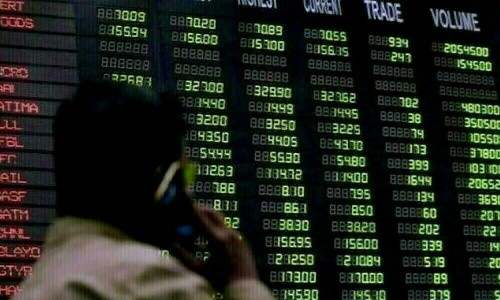Market Under Pressure: PSX Faces Downturn Amid Geopolitical Concerns
The Pakistan Stock Exchange (PSX) experienced significant selling pressure as escalating geopolitical tensions, triggered by recent events, sparked apprehension among investors. The benchmark KSE-100 Index plummeted nearly 2,400 points during Monday’s trading session.
As of 1:50 PM, the KSE-100 Index was recorded at 117,653.74, reflecting a substantial decline of 2,369.49 points, equivalent to a 1.97% decrease.
Market Analyst Commentary
According to Mohammed Sohail, CEO of Topline Securities, the Pakistani stock market commenced trading with a sharp decline of 1,700 points, or 1.4%, influenced by the prevailing tensions.
Sector Performance
Widespread selling activity was evident across the board, particularly impacting key sectors such as automobile manufacturers, oil and gas exploration firms, oil marketing companies (OMCs), power generation companies, and commercial banks. Major stocks, including OGDC, PPL, POL, HUBCO, and PSO, experienced declines in value.
Previous Week’s Performance
The PSX had already faced volatility in the preceding week due to a combination of factors, including heightened geopolitical risks in the Middle East, fluctuating international commodity prices, and mixed signals from the domestic economy. These elements collectively weighed on investor confidence.
The KSE-100 Index had already retreated from its recent peak, closing the previous week at 120,023.23 points, which represented a 1.7% decrease from the prior week’s closing figure of 122,143.57 points.
Global Market Overview
Asian markets also saw declines, and oil prices briefly reached a five-month high as investors awaited potential retaliatory actions. These concerns introduced risks to global economic activity and inflationary pressures.
Initial market reactions were measured, with only a slight increase in demand for the U.S. dollar as a safe-haven currency and no widespread panic selling observed.
Oil prices initially surged by approximately 2.8% but later receded from their peak levels.
Some analysts expressed optimism, suggesting that de-escalation could occur, or that changes in government leadership might lead to a less confrontational stance.
Geopolitical Implications
The Strait of Hormuz remains a crucial point of concern, given its narrow width of approximately 33 km (21 miles) at its narrowest location. It facilitates a significant portion of global oil trade, accounting for around a quarter of the total, as well as 20% of liquefied natural gas supplies.
Currently, Brent crude is up by 2.7% at $79.12 a barrel, while U.S. crude has increased by 2.8% to $75.98.
In other commodity markets, gold experienced a marginal decrease of 0.1%, trading at $3,363 an ounce.
Stock markets have demonstrated resilience thus far, with S&P 500 futures down by 0.5% and Nasdaq futures declining by 0.6%.
MSCI’s index of Asia-Pacific shares excluding Japan has fallen by 0.5%, while Japan’s Nikkei has seen a decrease of 0.9%.
Europe and Japan are heavily dependent on imported oil and LNG, while the United States is a net exporter of these resources.
This information reflects an intra-day market update.



Comments (0)
No comments yet. Be the first to comment!
Leave a Comment